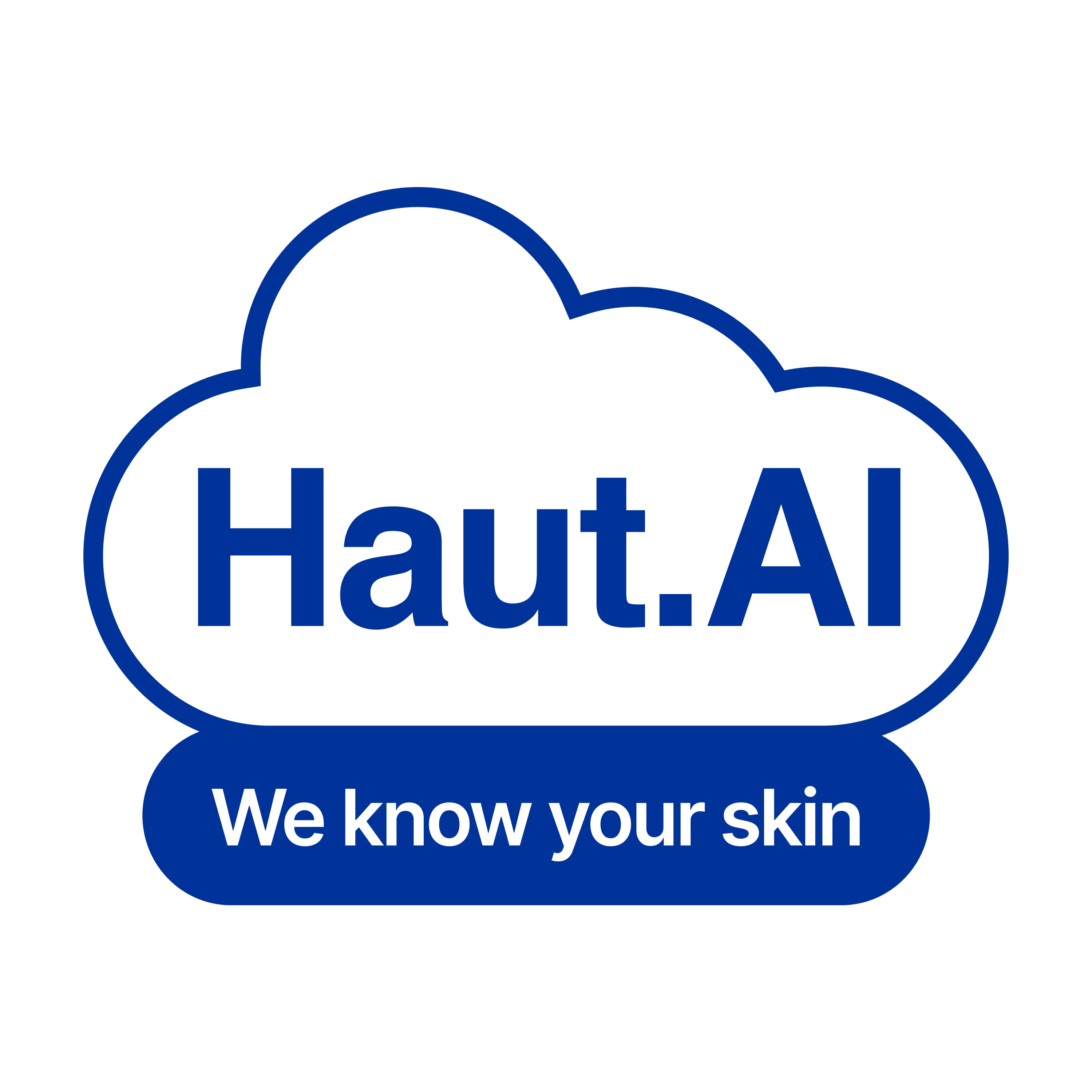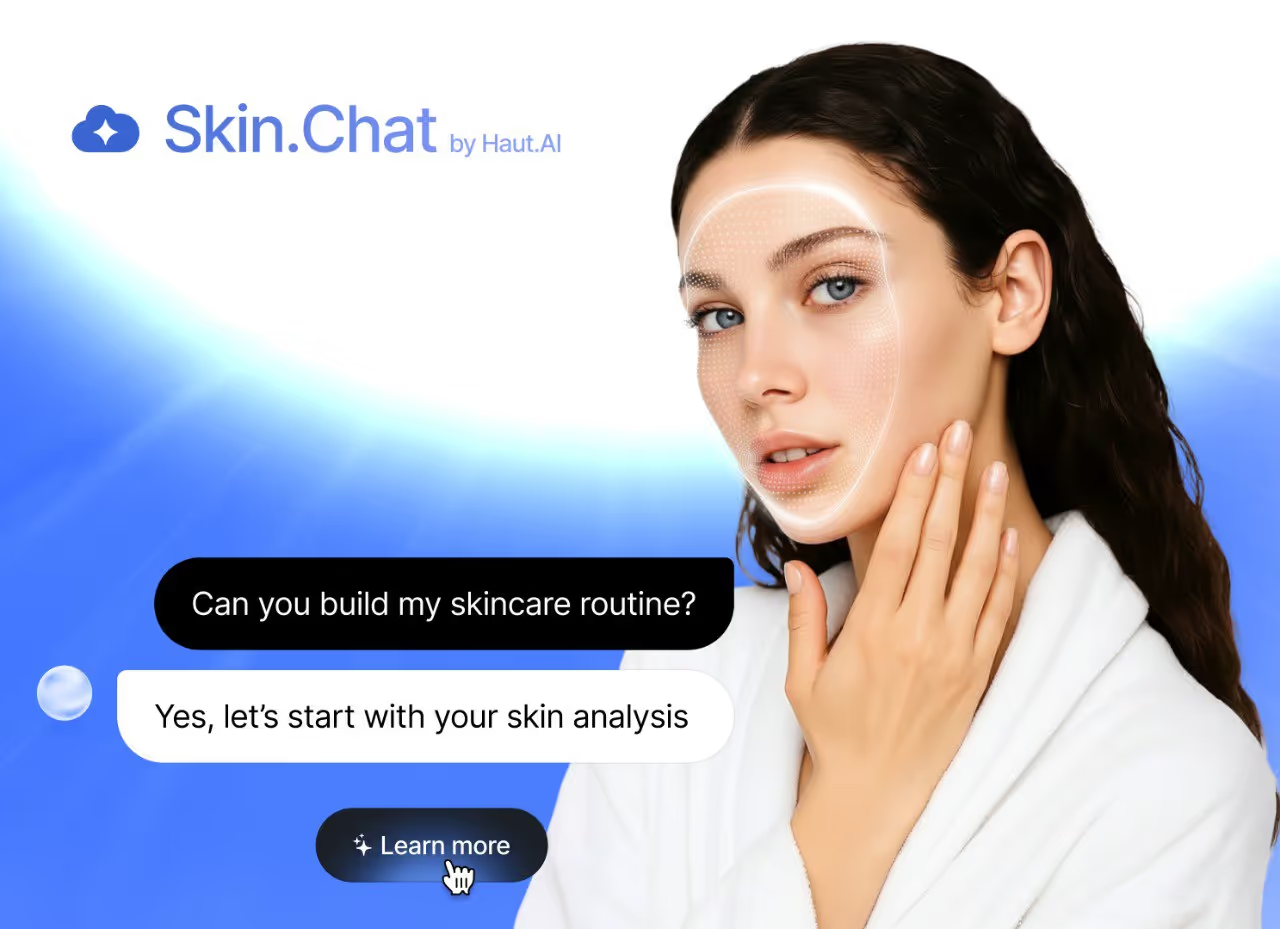.avif)
Haut.AI gifts 1-month free trial of Skin.Chat ->
Haut.AI gifts 1-month free trial of Skin.Chat ->

.avif)



One of the biggest challenges in beauty eCommerce is that consumers often don’t fully understand their own skin, leading to frustrating trial-and-error shopping experiences (Fortune Business Insights). At the same time, beauty brands with eCommerce platforms struggle to guide their customers toward the right products—especially online, where in-person consultations aren’t an option.
The issue isn’t a lack of great skincare products but rather ensuring the right products find the right people at the right time. That's where AI product recommendations come in!
The product recommendations presented by an eCommerce site play a critical role in not just supporting business needs but also shaping the customer experience, driving sales, and boosting average order value (increase reported in up to 50% of companies using AI-powered product recommendations).
However, traditional recommendation systems focused on trending products and popular product features are becoming increasingly outdated compared to sophisticated AI-driven solutions like those offered by Haut.AI.
In this blog post, we’ll explore how AI is changing personalized product suggestions in the beauty industry, making them more accurate, effective, and trustworthy.
Most traditional systems in use on beauty eCommerce websites rely on simple, rule-based techniques, such as collaborative filtering or popularity-based methods. Let’s take a look at how these approaches typically work:
These methods push product discovery based on sales volumes or trending products rather than identifying relevant products based on individual skincare needs. While these approaches can generate initial interest, they often lead to dissatisfaction when a product doesn’t work for a specific skin type or skin issue.
For example, online shoppers may be drawn in by hype or social media buzz, only to realize later that what works for their favorite beauty influencer may not work for them. This trial-and-error method can be frustrating, leading to disappointment, lost time, wasted money, and even exacerbated skin issues or new irritations.
Without personalized recommendations based on dermatologist-backed skin science, customers are left guessing. They may achieve short-term results by chance, but that rarely translates to long-term skin health.
In this approach, customers are grouped based on broad categories of customer data like age, gender, purchase history, and purchase patterns in an attempt to increase eCommerce sales.
However, this strategy often oversimplifies skincare needs and wants, and the resulting AI recommendations often don't account for individual skincare concerns or changing skin conditions.
Skin is highly personal—a moisturizer that is perfectly hydrating for one person in their thirties may cause issues for another person in the very same age bracket but with a different lifestyle, diet, climate, or skin sensitivities.
With this type of segmentation, offering relevant recommendations based on customer preferences is rarely a top priority. Instead, customers are funneled into highly generalized categories, leaving them with products that may be ill-suited to their unique skin journey. It's 2025—we can do better than that!
Traditional eCommerce sites use content-based filtering, which generates "If you like this, you might also like..." or “Customers who bought this also bought…” suggestions to cross-sell complementary products. And while "frequently bought" product offerings are sometimes helpful, these recommendations often feel impersonal and irrelevant.
This inevitably leads to a poor customer experience, abandoned carts, lost sales, higher return rates, lower average order values, and reduced overall customer lifetime value (LTV) compared to AI-driven product recommendations.
The majority of shoppers prefer tailored shopping experiences that cater to their needs. They want to feel understood, not trapped in a one-size-fits-all sales pitch. When recommendations miss the mark, it's not long before customers begin to second-guess their purchases, hesitate to check out, or even abandon the brand altogether.
Without consistently good product recommendations and genuine guidance akin to an in-person visit to the beauty counter, the online shopping experience can feel more frustrating than empowering or exciting.
Machine learning and AI-powered systems have disrupted traditional models by tapping into detailed customer data to offer highly precise, personalized product suggestions tailored to each customer’s unique skin profile. Here are the key features that make these AI-powered recommendation engines superior:
Machine learning and AI-driven models analyze vast amounts of historical and real-time customer data points, including detailed analyses of customer attributes, to continuously learn and adapt to individual conditions, preferences, and behaviors.
This ensures that personalized recommendations stay relevant, leading to higher engagement, better customer interactions, stronger brand loyalty, more relevant product recommendations, and a higher potential for repeat purchases. In short, with AI recommendations, every suggestion feels like it's made just for you—because it is!
AI can analyze facial images to detect skin concerns like wrinkles, pigmentation, acne, hydration levels, and skin texture irregularities—all from the comfort of the consumer’s home.
By integrating real-time biometric insights, platforms like Haut.AI provide scientifically validated, dermatologically accurate, and highly relevant product suggestions.
This level of precision is game-changing! It gives customers a deeper understanding of their skin's needs, taking them beyond guesswork and helping to eliminate second-guessing and purchase hesitation.
With personalized product recommendations tailored to their skin needs, they can finally make confident, informed decisions about the products they use.
The result? A more effective skincare routine, better long-term results, and a seamless, science-driven beauty experience that feels like having a personal dermatologist at their fingertips.
Unlike static systems, AI continuously learns from user interactions and adapts to customer preferences, environmental factors, and evolving skincare needs, allowing it to offer product recommendations that customers love. These systems get more accurate over time and can operate without previous customer data by using collaborative filtering techniques.
This means that as a person's skin changes, their recommendations do, too. This adaptability in terms of personalized recommendations dramatically improves product matches, increasing user satisfaction, significantly boosting eCommerce sales, and reducing the likelihood of product returns.
AI integrates contextual data like geographic location, local climate conditions, seasonal factors, and lifestyle habits to fine-tune recommendations. These factors have a significant impact on skin health, but it is not uncommon for customers to find it difficult to gain a solid understanding of which product recommendations best align with their unique skin needs.
The data consulted also includes current weather conditions and the UV index. So, for example, if a user lives in a dry climate, the artificial intelligence can prioritize hydrating products suited to their environment.
The rationale behind each specific customer recommendation is detailed via the product descriptions, where all product features and product attributes are clearly outlined for the customer.
Haut.AI improves the customer's online shopping journey by using advanced artificial intelligence and machine learning algorithms to deliver highly personalized product recommendations, helping customers find the perfect match for their unique skin profile.
This journey begins with an intuitive but guided process that shows customers exactly how to photograph their skin, progresses through rigorous skin analysis, and finishes by precisely matching the person to the best products for their needs—products customers truly need and want.
Effective AI skin analysis starts with high-quality images. Haut.AI’s proprietary Live Image Quality Assurance (LIQA) system guides users through capturing standardized, well-lit, properly positioned selfies for accurate skin analysis.
Besides, we utilize FACE 180 - our proprietary technology that captures facial images from three angles: front, left profile, and right profile. This multi-angle imaging enables a more comprehensive analysis of facial features, symmetry, and skin condition, paving the way for next-level personalized skincare insights.
Our research shows that with LIQA, 87% of user images meet diagnostic standards, compared to just 32% without guided capture. This technology significantly enhances the quality of the data captured, ensuring accurate, reliable analysis (Read more about LIQA).
Once standardized images of the face are captured, Haut.AI’s deep learning algorithms assess the skin based on more than 150 facial biomarkers across 15+ essential skin metrics, such as hydration, wrinkles, redness, pigmentation, acne severity, shininess, texture irregularities, and even subtle signs of aging.
These models have been trained on millions of dermatologist-validated images and are backed by peer-reviewed scientific research. Haut.AI has had studies published in reputable journals such as Plastic and Reconstructive Surgery and SPIE Medical Imaging (Scientific Validation).
Haut.AI then matches the analyzed skin data with skincare products using advanced product tagging and skin biomarker matching algorithms. Unlike traditional recommendation systems that rely on purchase history, browsing history, or user demographics, Haut.AI continuously updates product recommendations based on the user's real-time skin conditions.
This means they are always matched with the most relevant and effective products for their skin.
For example, as the person's skin changes due to product use or environmental factors, the AI-driven recommendations system adapts its suggestions accordingly, always reflecting the person's current skin needs.
This dynamic matching process significantly reduces return rates (by up to 35%, according to Haut.AI’s internal studies) and increases conversion rates (by as much as 50%), making it a win-win for both consumers and brands.
Haut.AI’s algorithms are not only clinically validated but also clearly and honestly explain AI product recommendations based on detailed skin diagnostics. The recommendation engine helps consumers understand why a product is suggested. It's not just about increasing sales—it's about fostering trust and confidence through consistently great product recommendations.
With its patented facial image anonymization technology, “Skin Atlas”, Haut.AI ensures consumer privacy and strict compliance with global data protection regulations, like GDPR and HIPAA. We know how important it is to communicate data usage policies to customers when implementing AI recommendations. And we're committed to taking the utmost care when we collect data from our users—especially their first-party data—to deliver AI recommendations.
Haut.AI's AI-powered recommendation engine is at the forefront of innovation in beauty eCommerce. Technologies like SkinGPT - a next-generation generative AI platform - allow consumers to visualize, through photorealistic simulations, how skincare products, new routines, and even environmental factors will impact their skin over time.
According to research, over half of consumers now expect personalized offers during their shopping experience. At Haut.AI, we know that understanding customer preferences through data analysis enhances engagement in eCommerce.
By blending robust clinical data with environmental insights, recommendations are becoming even more precise, adapting dynamically as the consumer’s skin changes. Imagine a skincare routine that evolves with you—no more guesswork, just science-backed recommendations tailored to your needs.
And the best part? It’s only getting smarter! As AI continues to evolve, the beauty brands that embrace these advancements will shape the future of online beauty product shopping, turning skincare shopping into a highly engaging, personalized, science-backed experience.
Haut.AI’s sophisticated AI capabilities are paving the way by setting new industry standards, building trust, improving customer satisfaction, and driving sustainable growth for beauty brands worldwide. The future isn’t just AI-powered; it’s personal, transparent, and smarter than ever.


